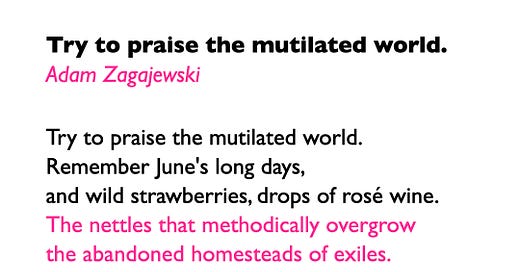You must be wondering what happened to the June edition of the Poetly Digital Calendar. This time’s poet-artist collaboration was ready, but the release got slightly derailed because of some unforeseen complications that arose during these uncertain times. Yes, I know, you’ve probably heard or echoed this sentiment about ill health (not one's own necessarily) disrupting work, several times in different forms since the past year. Nevertheless, the pandemic’s schizophrenic effect on the everyday lives of people, continues. I apologise for this delay - I will be releasing it soon, hopefully in the coming few days.
Meanwhile, today, I’d like to share with you a poem that, when it was first published, became an anthem of sorts. It’s visionary call stood in for the anxiety, fear and loss of hope, that cast a dark shroud over a generation of people who were losing touch of a complex, insidious and violent reality. This poem has often been cited in the context of angst, fear and disorientation felt post the 9/11 attacks. The Polish Poet, Adam Zagajewski’s, Try to Praise the Mutilated World was written with the natural cadence of a gaze that settles patiently on a moving circus of characters and conflicts, coupled with a deep sensitivity for minutiae. This sensibility manifests in his many manifestos and contemplations. Like poets whose words outsoar their political reality, becoming slogans for a better, more meaningful world at whose centre is the truth of the downtrodden, and the mystic lightness of those who have transcended, Zagajewski’s musings have epic echoes. He finds meaning in the darkness, while being empathetic to the raging fires that ravish whole communities, ploughing a universality of feeling, without being detached, or impersonal. The poem is a patchwork of stark images that concentrate the various “mutilations”, the lacerations on the body politic of this world we live in today. He takes conflict head on, outlining displacement, violence, death and depravity. But this is not despair, it is a clarion that booms through the “salty oblivion” of stormy seas, contrasting the joyful singing of executioners with concerts “where music flared”.
Zagajewski died in March this year, and there was a flurry of tributes that followed his quiet, uneventful death. I’ve come late to this place. I’ve had him bookmarked for a while now, but I wanted to share a different poem. Maybe some other time. For now, one last non-linear association with this juxtaposition of the terrible and the ecstatic, of dire suffering and of hope, of pain and of desire. The following passage is from Peter Brooks’ Mahabharata. An adapted version of this excerpt was used in the trailer of Thiagarajan Kumararaja’s marvellous Tamil neo-noir action thriller Aranya Kaandam:
What Bheeshma Said
“A man is walking in a dark, dangerous forest, filled with wild beasts. The forest is surrounded by a vast net. The man is afraid, he runs to escape from the beasts, he falls into a pitch black hole. By a miracle he is caught in some twisted roots. He feels the hot breath of an enormous snake, its jaws wide open, lying at the bottom of the pit. He is about to fall into these jaws. On the edge of the hole, a huge elephant is about to crush him. Black and white mice gnaw the roots from which the man is hanging. Dangerous bees fly over the hole letting fall drops of honey…Then the man holds out his finger – slowly, cautiously – he holds out his finger to catch the drops of honey. Threatened by so many dangers, with hardly a breath between him and so many deaths, he still can’t throw off his chains. The thought of honey holds him to life.”
- From Peter Brooks’ Mahabharatha
This translation of the poem is by Clare Cavanagh. His translations of Wislawa Szymborska’s poetry have been featured on Poetly before.




